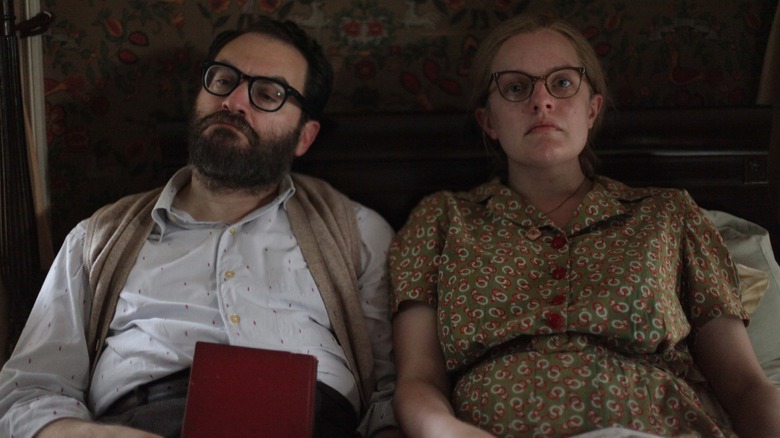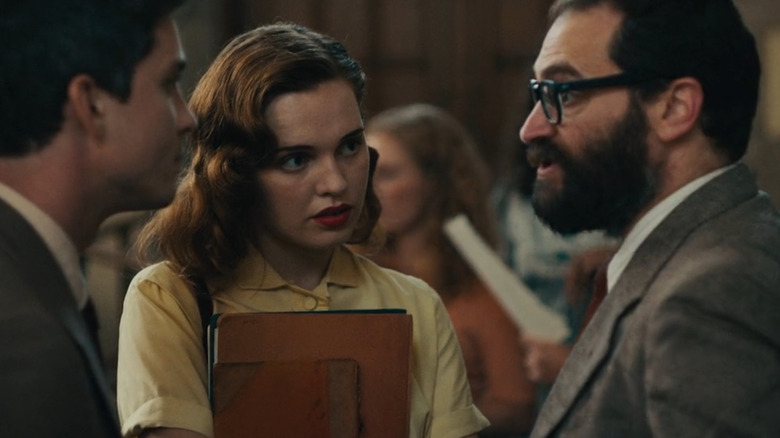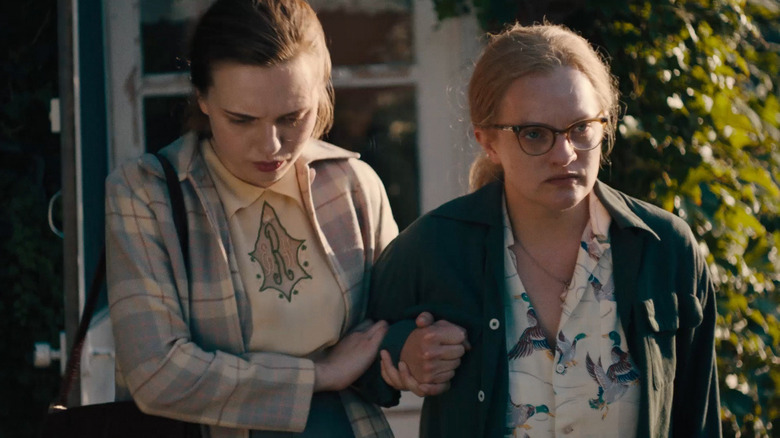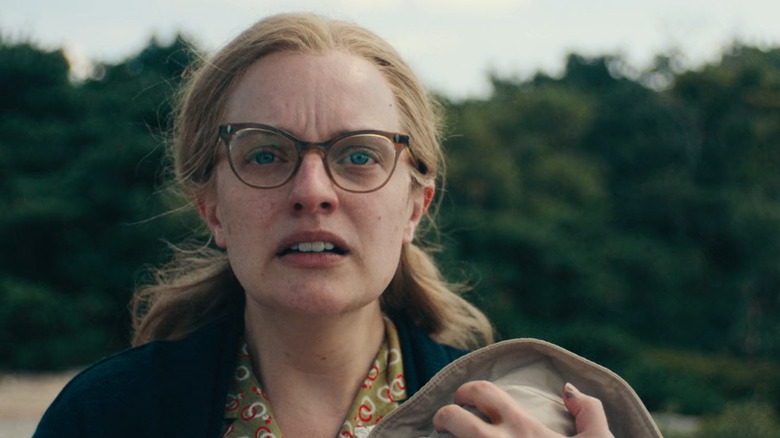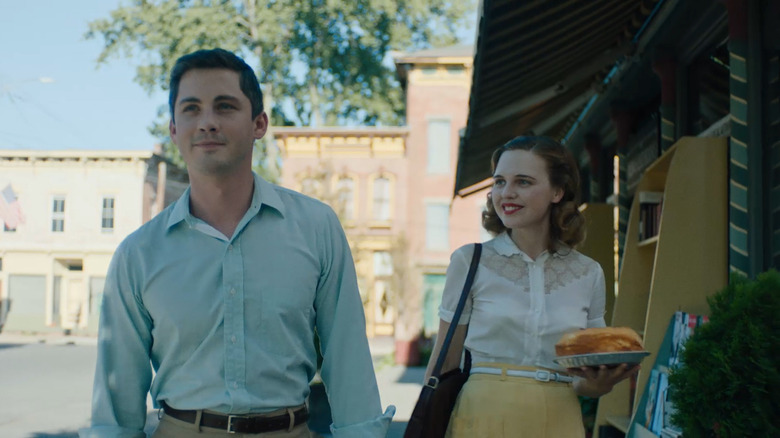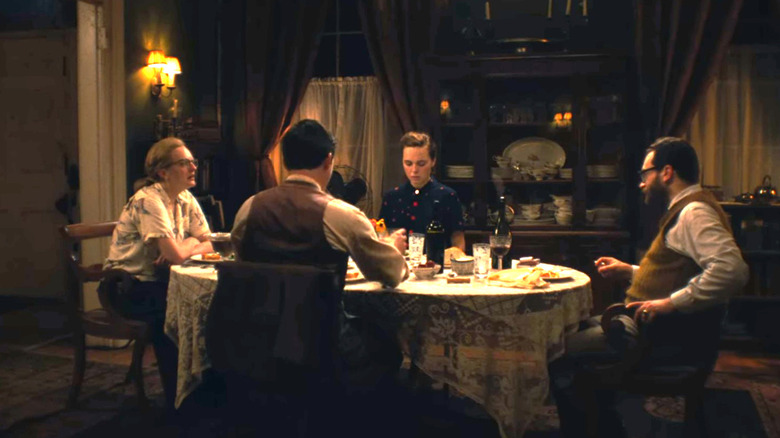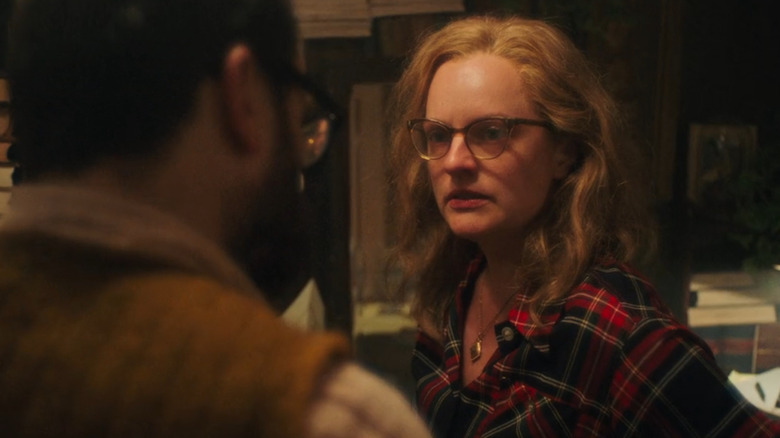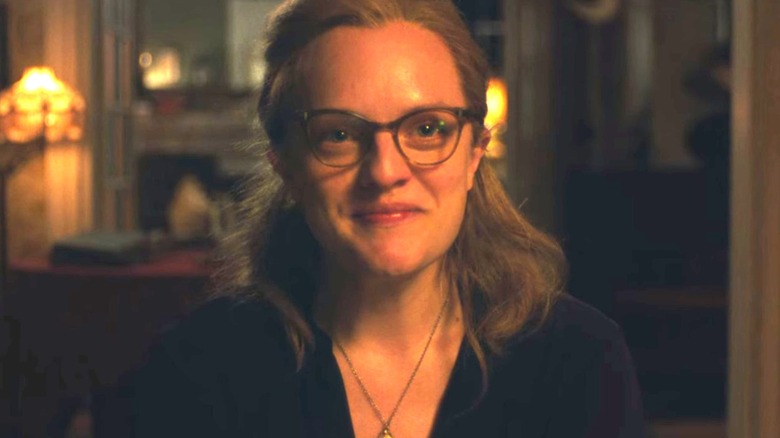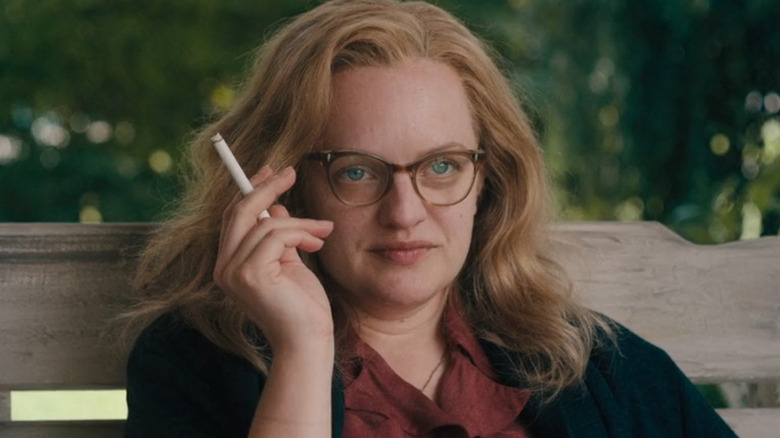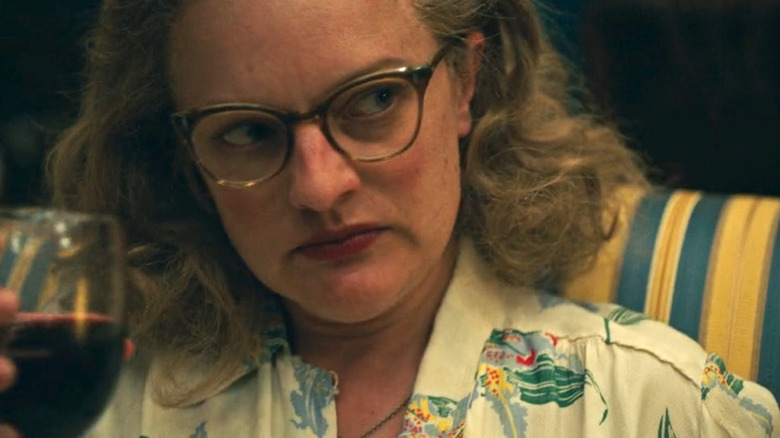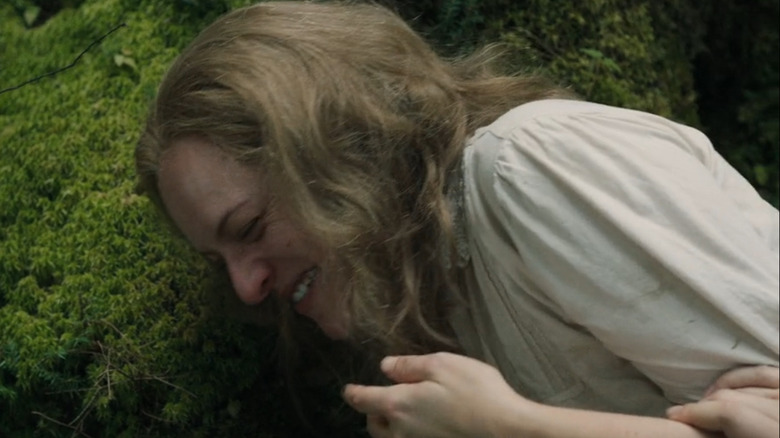The Ending Of Shirley Explained
In 2020, Elisabeth Moss took the eponymous role in "Shirley," a psychological drama based on a book by Susan Scarf Merrell. Though the story is entirely fictional, its central character is Shirley Jackson, the author of the iconic short story "The Lottery." In the film, we meet her during a difficult period in her life. In a deep depression, Shirley struggles to leave her home and is constantly at odds with her husband Stanley (Michael Stuhlbarg), who is breathing down her neck to get back to work and begin writing again.
"Shirley," though, is not just about the author's attempt to write her 1951 novel "Hangsaman," but also about her disturbing relationship with Rose Nemser (Odessa Young), the young wife of Stanley's pupil Fred (Logan Lerman), who has come to live with Shirley as a live-in caretaker. As much a mystery and thriller as any one of Jackson's own stories, "Shirley" has mystified audiences as much as it dazzled critics. Now, we're here to dig deeper into the film and explain the unsettling ending.
What you need to know about the story
"Shirley" begins with horror writer Shirley Jackson in the throes of a severe bout of agoraphobia and struggling to assemble a new book. Her husband Stanley is an esteemed professor at the all-woman's Bennington College in Vermont, and he's managed to convince his budding protege Fred Nemser and his pregnant wife Rose to stay with them. As part of the arrangement, Rose begrudgingly agrees to serve as a caretaker of sorts for Shirley after the unexplained departure of their last housekeeper.
At first, the arrangement is a difficult one. Though Rose is a fan of Shirley's work, she finds the writer bitter and belligerent, with a nasty and dismissive attitude towards her. Rose is troubled further when she learns that Shirley is seemingly happy to overlook her husband's frequent love affairs with his students. Rose's husband Fred, meanwhile, feels like he is not being taken seriously. His dreams of becoming a tenured professor hit a roadblock, and he becomes convinced that Stanley may be intentionally holding him back.
Despite the rough start, Shirley takes a strange liking to her new caretaker and becomes motivated in her newest work, developing a novel about a young woman lost in the woods. Though she is basing the book on the story of a local student who'd disappeared under mysterious circumstances, Rose herself begins to serve as an influence on the story.
What you need to know about the relationships in Shirley
At its core, "Shirley" is a story about the relationships between its four main participants: troubled writer Shirley, her overbearing husband Stanley, his apprentice Fred, and Fred's young wife Rose. At first, Rose and Fred appear to have a happy new marriage — often seeming like a pair of passionate lovebirds — but as the story progresses, cracks begin to show. Fred's ambition is making him dismissive of Rose's needs, which becomes increasingly unnerving as the birth of their child nears.
Meanwhile, Shirley is eager to prove to her husband that she can write her next great work without him controlling her. All the while, Stanley does indeed come to feel threatened by Fred's career, unwilling to accept that a mediocre scholar could achieve anything close to his level of success when he is such an accomplished and talented mind. The real heart of the film, however, is the surprising friendship-turned-quasi-romance between Shirley and Rose.
Though they don't get off to the best start — with Shirley downright abusive towards her new caretaker — she eventually begins to see Rose as something of a muse, and even a kindred spirit. The two eventually bond, with Shirley, often seeing herself in Rose, and they even begin a near-sexual flirtation. Rose for her part helps bring Shirley out of her reclusiveness, and before long the once reluctant caretaker can't imagine not being by the author's side.
What happens at the end of Shirley
As the ending of the film draws near, Shirley's newest work, "Hangsaman," is taking shape. Though it's based on a real-life missing persons case, much of her inspiration comes directly from Rose — things she's said and even elements of her own life. Still, a proper ending for the novel eludes her, and Stanley fights her on her ability to complete it.
At the same time, Rose's baby has been born and Fred's career as a professor begins taking off too. That's when he drops a bombshell on Rose, telling her that they're moving out of Shirley's home. But with Rose having developed an intimate relationship with Shirley, the new mother is shaken, not wanting to leave. So when Shirley tells her that Fred has — like her own husband — been sleeping with his students behind her back, she is distraught at the thought of losing the woman who has given her life new meaning, and the father of her child.
Shattered, Rose confronts her husband, and in her troubled state runs off into the woods. Shirley, with the baby in her arms, finds Rose on a precipice, ready to jump and end her own life. Shirley is able to talk her down, but the incident has a profound effect on them both: Shirley finally has the ending she needs for "Hangsaman," and Rose resolves to never be the submissive wife she once was.
The truth about Fred
When we first meet Fred Nemser, he seems like a wide-eyed aspiring scholar, eager to prove himself a capable professor just like his mentor, Stanley Hyman. Madly in love with his beautiful wife Rose, he's first portrayed as a noble father-to-be. However, a closer look at his part in the film reveals something very different. In most of his interactions with Rose, Fred is driven almost entirely by his lust for her, with many of their on-screen moments being either passionate love scenes or petty bickering.
It really isn't much of a surprise to learn that the late nights he claims to be spending with Stanley after class — with the so-called Shakespeare Society — are really his cover for the extra-marital affairs he's been having with his students. In fact, Shirley reveals to Rose that there is no such thing as the Shakespeare Society: it's really just a euphemism for the group of young, love-hungry female students who pick which male professors they want to sleep with. As it turns out, it's a sordid world that Shirley is well aware of and that Rose has been completely oblivious to until now. Far from the kind, good man he seems to be, Fred is more corrupt than we'd been led to believe.
The reality of Stanley and Shirley's relationship with Rose and Fred
The true nature of the relationship between Shirley Jackson and her husband Stanley changes throughout the film. Or rather, our perception of it evolves. At first, Stanley comes across as domineering and controlling — at times even abusive — though there's always an element of pure idolization in him as well. He sees his wife as a genius in her own right, but one who needs him — and by extension his control — in order for her to be productive.
Once they take in Rose and Fred, the nature of Shirley and Stanley's dynamic begins to shift. Both seem to delight in antagonizing their younger counterparts, although for different reasons. We might think initially that Stanley's treatment of Shirley serves as a kind of cycle of abuse as Shirley turns her frustration on Rose, but the truth is something a little different. Shirley and Stanley both use Fred and Rose in a twisted, parasitic relationship.
When "Shirley" ends, we realize that Stanley's treatment of Shirley is how he pushes her to greatness, how he extracts her genius, and in turn her relationship with Rose is how she gets her inspiration for her story.
What does the ending of Shirley mean?
"Shirley" is more than a story about the crafting of a classic piece of literature, it is also a story of the toxic relationships and cycles of abuse that women in particular often find themselves in. It's no coincidence that the film is about a woman, directed by a woman, based on a book by a woman author, and adapted by a woman screenwriter. The struggle of women — in their relationships and beyond — is at the center of the film.
It's clear from the very beginning that Shirley and Stanley's marriage is not a healthy one, even if they do each get some measure of contentedness from it. While Shirley must deal with her husband's borderline abuse, he also feeds her ego and she seems to relish the clear reverence he has for her creative genius. Similarly, his support of her alcoholism is a kind of abuse itself, even if there is no sinister motive behind it. Because her own worst behaviors — from her inability to leave her own home to her violent mood swings — are only exacerbated by her addiction.
The film — like the works of Shirley Jackson — is about women who feel unseen by society. Or as the author herself puts it in the film, "lonely girls who can't make the world see them." As much as Rose is overlooked by Fred — ignored in favor of his own students — so too does Stanley overlook Shirley, whose own agoraphobia keeps her away from the world. It is only through her writing, she can finally be seen.
Another possible interpretation of the ending
The ending of "Shirley" makes a few things clear: Shirley has been using Rose as a means to an end, as fodder for material, and to spur her creative spirit. Looking beneath the surface, there's a more sinister way to interpret the ending. The film's closing moments — a touching scene between Shirley and Stanley where they dance in their dining room — shows that their difficult relationship is something much more, and a second watch of the film reveals more about their intentions for Rose and Fred, who are eagerly discarded once Shirley finishes her novel.
We're forced to wonder about that early scene where Stanley first asks Fred and his wife Rose to live with them. Is it possible that their previous housekeeper didn't quit, but was similarly tossed aside once Shirley had finished her previous work? Could it be that Stanley's poor treatment of Fred was a manipulative tactic to drive him further from his wife, to give Shirley a muse with a complicated relationship of her own to use as material for her book? Seen in this way, Shirley and Stanley are not quite an abuser and victim, but a team who works together to use others for their own ends.
How the ending of Shirley mirrors Hangsaman
"Shirley" is set during the time in Shirley Jackson's life when she was working on the novel "Hangsaman." In the film, it's stated several times that this new story is based on the disappearance of a local student. However, we see how Rose's own life finds its way into the story — mostly because of what we know of the final book, which was published in 1951. In that story, a young woman named Natalie lives a solitary life under the thumb of her tyrannical father.
Over the course of "Hangsaman," Natalie befriends another woman and has a near-romance with her, in a striking parallel to Shirley's relationship with Rose. Later in the book, Natalie begins to take part in dangerous, often harmful behavior, until the climax where she stands atop a bridge, ready to fall to her own death — just as Rose does when she contemplates ending her own life on the edge of a cliff.
In the end, Natalie decides not to jump and instead chooses to use the ordeal as motivation to change her path, resolving to be a stronger person. This is almost exactly what happens with Rose in "Shirley," suggesting that "Hangsaman" was actually inspired by her caretaker. Like Natalie, she too ends her own story determined to be a new, stronger person after having a brush with death.
What Odessa Young said about the ending of Shirley
Though the movie is named after the author played by Elisabeth Moss, it's Odessa Young's character of Rose that undergoes the greatest change in "Shirley." It wasn't lost on Young, though, and she talked about how the film was open to multiple interpretations in an interview with Collider. She believes, not everything seen on screen can be taken literally, and some things may even be in the head of its characters.
"I have my own theories about which parts of this movie is a dreamscape, which parts are symbolic, and which parts are literal or narrative," she explained. "Part of me wants to believe that Shirley might be seeing herself, as a young woman, and she meets Rose." That interpretation is certainly an apt one, as Rose can easily be seen as a proxy for Shirley's younger self who hadn't yet developed her inner strength, and the events of the film serve to harden Rose as some unseen event did for her. And for Young, the ending seems to imply a similar future for Rose in Shirley's tale.
"I do want to believe that she goes off and starts a writing career of her own." Could Rose have the strength to leave her husband that Jackson lacked? "I wanna believe that there's a future for her, where she's a bit more difficult [than Shirley Jackson] to handle."
What Elisabeth Moss said about the ending of Shirley
Like Odessa Young, star Elisabeth Moss also spoke about the film's ending and shared similar thoughts on what meaning she saw in it. "To Shirley, [Rose] represented Shirley at a younger age," she said in an interview with Vox, echoing Young's own interpretation of the film. "She represented Shirley not just as a writer, but as a woman at a younger age." Once again, Moss believed that this was a story not just about toxic relationships, but specifically about the women who become trapped in them.
"Shirley admires Rose, and also is jealous, and also wants her to succeed, at the same time," Moss explained. "I think she wants her not to make the same mistake that she made." Moss also pointed out that the film's period setting was also important to understand its meaning because, in the 1950s, marriages were heavily askew in favor of men.
Moss also suggests that perhaps there is a future for Rose that is better than the present that Jackson finds herself in. "I think she sees Rose and just is like, 'please don't go down the path that I did. Please make your own way. Please don't feel like you have to answer to your husband.'"
How Shirley Jackson really spent her final days
Though "Shirley" is based on real-life author Shirley Jackson, the film is not a biopic, but instead based on a purely fictional novel inspired by the life of the real person. In fact, the film takes quite a few liberties with her story.
While the real Jackson did indeed have mental illnesses — including social anxiety and agoraphobia — and did struggle with alcohol abuse throughout her later years, pretty much everything else in the film was fabricated. The story of Rose and Fred was the creation of Susan Scarf Merrell, whose book the movie is based on. The real Shirley Jackson's later life, though plagued with problems — including the decline of her marriage to Stanley Hyman — also saw the publication of one of her most famous works, "The Haunting of Hill House" which was released in 1959. Jackson died in her sleep six years later, at the age of just 48.
How Jackson's children really felt about Shirley
"Shirley" changed a lot about the true story of Shirley Jackson, but we haven't even mentioned the most notable alteration to her life: The film completely eliminates the fact that she had children. In fact, by the time she wrote "Hangsaman," she already had three children. Her fourth child, Barry Hyman, was born the same year "Hangsaman" was published, meaning she was likely pregnant while writing it. This change prompted a critical response from at least one of Jackson's children when "Shirley" was released.
"The screenwriter and director were attempting to make a movie in which Shirley was like a character in one of her own stories," said Laurence Jackson Hyman in an interview with The Press Democrat. "My mother would never have openly insulted someone at the dinner table, as she does in the movie," he said. "There are enough real facts in the movie to make you think it's a biopic. But then it diverges, becoming entirely fiction."
He also told the paper that the mother he remembers was far from the hard-drinking, sullen, angry woman played by Elisabeth Moss in the film. However, that doesn't mean he wasn't happy with the film, going on to say, "The movie is thoughtful and artfully made, and I think Moss is a very talented actress."
If you or anyone you know needs help with addiction issues, may be the victim of abuse, or is having suicidal thoughts, contact the relevant resources below:
-
Visit the Substance Abuse and Mental Health Services Administration website or contact SAMHSA's National Helpline at 1-800-662-HELP (4357).
-
Call the National Domestic Violence Hotline at 1−800−799−7233. You can also find more information, resources, and support at their website.
-
Please call the National Suicide Prevention Lifeline by dialing 988 or by calling 1-800-273-TALK (8255).
